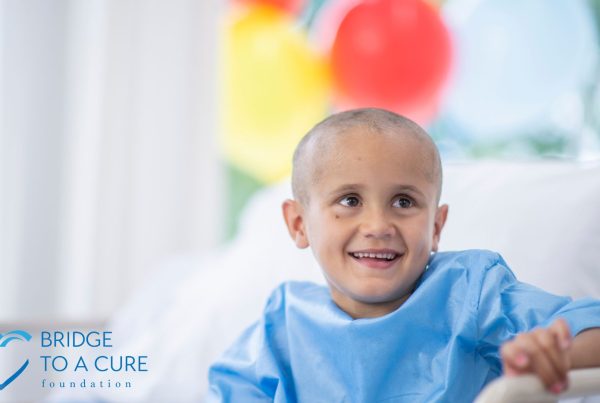The Mission of the Bridge to a Cure Foundation is to increase the pace and success of pediatric cancer research. Building a robust national database is essential to making that happen. But it won’t happen without creating an environment of collaboration within and across research institutions.
This blog discusses:
- Why collaboration is important.
- The primary barrier to collaboration within the pediatric cancer research community.
- What needs to be done to fix it.
Why collaboration is important.
- Pediatric cancer is so complex and multifaceted that to expect individual researchers or institutions to have the breadth of knowledge necessary to deliver breakthroughs is unrealistic. To solve the many urgent challenges that individuals have failed to solve on their own, science must be able to harness ideas, people, and resources from across disciplinary and organizational boundaries.
- The building of a robust national pediatric cancer database will require a level of transparency and data sharing our nation has never seen before. It won’t happen unless collaboration is institutionalized throughout the pediatric cancer research community.
- It works. We know one attribute that the most successful companies in the private sector share is a culture of collaboration.
- An extensive study by the National Bureau of Economic Research illustrates the changing nature of scientific work with the need for large numbers of individuals with distinctive expertise to work collaboratively in the solution of a complex scientific problem.
- Collaboration is more than just getting a group of people in a room to work together to solve a problem. Collaboration is a mindset and a way of life, a core value that helps define an organization’s culture. Collaboration is how an organization works to achieve goals and objectives.
Primary barrier to collaboration – reward systems
- The study noted above highlights that while the demands for new, more expansive modes of organization push scientists towards larger collaborative groups, the reward system for science has not necessarily changed as dramatically.
- Reward systems are foundational to the culture within many organizations. Yet reward programs in pediatric cancer research often reinforces a culture of insularity that discourages collaboration. We need to change these systems to inspire collaboration if we are going to start generating breakthroughs in pediatric cancer.
- The reward system in medical research, including pediatric cancer research, generally recognizes behavior that is in conflict with collaboration; rewards and awards tend to go to individuals for breakthroughs. This is true for research institutions, grants issued by foundations, and national recognition programs.
How to fix it
- Pediatric cancer research institutions need to establish reward and recognition programs that inspire and motivate individuals to work collaboratively. Some ways to do this include:
Have team goals and team milestones. Make the team achievements the focus of the reward system.
Don’t ignore the individual. Each team member is still thinking about how their individual performance review will go. Include their individual performance towards collaboration and team goals, not just individual goals, in their reviews.
Keep the team focused on achieving outcomes, but reward acts of collaboration as well, especially if your team is in the early stages of creating a collaborative culture.
- Foundations need to add collaboration as criteria for awarding grants.
Foundations can influence and change culturesollaborative, if they make teamwork and information sharing a requirement for awards.
They need to find ways that allow the evaluation of grant proposals to factor in collaboration – between teams, disciplines, and even companies and institutions that may be considered competitors.
Within the context of collaboration, grant awards must include data sharing and transparency.
- Most annual recognition programs reward individual achievements. This holds true across all organizations, from the Nobel Prize to research foundation awards to the numerous industry association citations presented each year. Collaboration should be made an important criterion for all annual recognition programs.
Making collaboration a priority for the pediatric cancer research community is essential to achieving the breakthroughs so many children are counting on. To read our prior posts providing solutions to improving our approach pediatric cancer research, visit www.bridgetoacure.org.
The Bridge to a Cure Foundation is the lead advocate for modernizing our approach to pediatric cancer, with a priority on building a pediatric cancer database to speed up the search for cures. We have met and gained the support of over 120 institutions and practitioners, including the former NCI Director Ned Sharpless who has become a forceful proponent and driver of this initiative in Washington. To learn more about the foundation and add your support, visit www.bridgetoacure.org.






